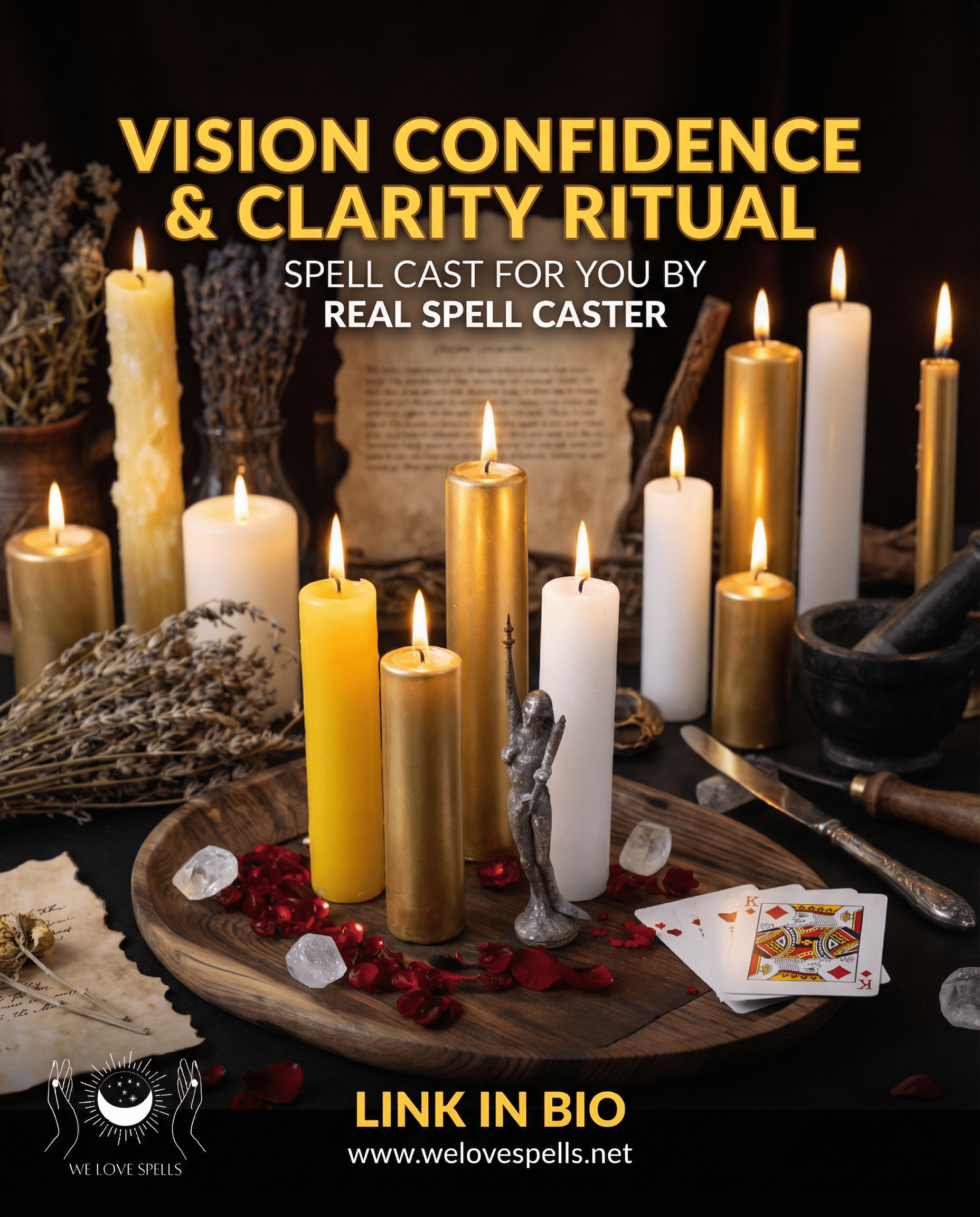The Power of Herbs in Witchcraft: A Beginner's Guide to Herbal Magic
How Do Love Spells Work? — Key Takeaways on the Power of Herbs in Witchcraft
- Herbs channel magical energy and intention in love spells, protection rituals, cleansing, and divination.
- Popular herbs like rose, lavender, and mugwort are used for attraction, healing, and enhancing psychic abilities.
- Sustainable sourcing, expert guidance, and safety are essential when selecting and using magical herbs.
- You can integrate herbal magic into daily life through ritual baths, spell sachets, homemade incense, and more.
- Get expert-crafted, real love spells that work from professional casters—shop spells online today at WeLoveSpells.net.
Beginner's Guide: Unlocking the Magic of Herbs in Witchcraft
For centuries, herbs have been the heart of witchcraft and Wiccan rituals//—blending nature’s energy with spiritual intention. Each leaf or petal is infused with unique vibrations, offering potent magical properties and deep symbolic meaning for those who seek transformation.
Whether you’re casting a powerful love spell, cleansing your aura, or connecting with the divine, herbal allies can amplify your energy and results.
Ready to experience real magical transformation? Shop authentic love spells online from verified spell casters—and let your desires manifest with the power of herbs.
Get your spell cast by the best spell caster in the world →Why Herbs Matter in Spellwork & Witchcraft
Herbs are natural channels for intention, healing, and spiritual connection. Carefully chosen plants can help you direct energy, call forth love, shield your space, or connect with guides and ancestors. Their energies are as ancient as the earth itself.
- Amplify intentions in magic and ritual work
- Cleanse and protect your home or aura
- Offerings and messages to deities or spirits
- Enhance intuition, psychic vision, and meditation
Imagine sage smoke banishing negativity or rose petals weaving deep romance into your life—each herb becomes a powerful tool for self-empowerment and love.
How to Use Magical Herbs: Forms, Methods & Ritual Applications
Herbs are endlessly adaptable in your spiritual practice. Each method allows you to tap into different aspects of their magical potential:
- Dried herbs: Store for use in spell bags, loose incense, powders, and ritual blends.
- Fresh herbs: Bring vibrant, living energy—great for altar decor or bath rituals.
- Herbal oils & tinctures: Perfect for anointing candles or yourself before ritual.
- Teas and infusions: Drink or sprinkle (if safe!) during spells—but always research herb safety first.
Use your creativity! Whether crafting a protection sachet or a love-attracting bath, herbs empower your intentions. For manifesting fiery romance, try our proprietary Flames of Passion Love Spell—expertly blended with love-drawing botanicals.
Essential Witchcraft Herbs: Properties, Meanings & Correspondences
Knowing the magical correspondences and symbolism of popular herbs improves spell accuracy and power. Here are a few of the most cherished plants:
| Herb | Key Properties | Symbolism | Main Magical Uses |
|---|---|---|---|
| Lavender | Calming, protective | Peace, tranquility, love | Relaxation rituals, love spells, restful home |
| Rose Petals | Heart-opening, attraction | Love, devotion, beauty | Love & reconciliation spells, enhancing charm |
| Mugwort | Dreamwork, intuition | Prophecy, psychic vision | Divination, lucid dreaming, boosting intuition |
Seeking relationship harmony or heart healing? Discover our Unconditional Love Spell or soothe heartbreak with the Mend a Broken Heart Healing Love Spell, crafted with energetically aligned herbs for deep emotional shifts.

Herbal Magic Ethics: Safety, Responsibility & Sustainability
- Do not ingest herbs if you are unsure of their safety!
- Choose organic, ethically sourced herbs; avoid endangered species.
- Grow your own magical garden for sustainable, fresh ingredients.
Ready to start your apothecary? The Witchcraft Herbs Kit delivers high-quality, handpicked botanicals—perfect for beginners and advanced witches alike.
Herbs for Love, Reconciliation, & Attraction Spells
Herbs are essential for real love spells, attraction rituals, and emotional healing. Traditional romantic botanicals include:
- Rose petals, basil, cinnamon, and damiana—for attracting a lover, deepening affection, and fiery connection
- Lavender—to calm a troubled heart or infuse tranquility into a relationship
- Clove & ginger—for passion and energetic "spark" during reconciliation
Healing a bond? Pair your intention with the Reconciliation Love Spell or Bring Back Lost Lover Spell for guided, spiritual support.
- Craft incense blends with rose & lavender for healing rifts
- Enjoy herbal baths to draw love and romance into your aura
- Add spicy herbs to cleansing rituals for renewed desire
- Rachel T., Verified Buyer
Creating and Organizing Your Herbal Apothecary
Setting up a dedicated space for your herbal tools is both magical and practical. Here’s how to begin:
- Store dried herbs in airtight, labeled glass jars, away from sun and moisture.
- Maintain a reference journal describing each herb’s magical associations.
- Start with versatile staples like lavender, rosemary, sage, and mugwort—then add specialty botanicals for advanced spellwork.
- Reserve a section for romantic herbs to prepare for spells like the Lust for Me Love Spell.
- Maya H., Practicing Witch
How to Cleanse & Charge Herbs for Effective Spellwork
Cleanse away outside energy and infuse herbs with your personal desire before adding them to any spell. Try these proven methods:
- Sunlight or Moonlight: Let herbs absorb pure natural energies.
- Smudging: Pass through cleansing smoke from sage or palo santo.
- Crystal Charging: Place herbs beside quartz, amethyst, or related stones.
- Intent Meditation: Hold the herb and visualize your purpose flowing into it.
Cleansed, intention-charged herbs supercharge any ritual—especially spells like our Love Binding Spell, bringing lasting results.

Herbs, Planetary Forces, and Elemental Magic
Every herb is linked to planets and elements, further customizing your spells:
- Mars herbs (e.g., garlic, ginger): Add strength, courage, and banishing energy
- Venus herbs (like rose, hibiscus): Enhance love, beauty, and harmonious vibes
- Air herbs (lavender, sage): Boost mental clarity and communication
- Earth herbs (patchouli, vetiver): Offer grounding, safety, and abundance
Syncing your botanical choices with these energies strengthens all intention work—especially love spells or stability magic.
Bring Herbal Magic Into Your Everyday Routines
Witchcraft isn’t just for rituals—herbs enrich daily life!
- Sprinkle cinnamon for love and prosperity into coffee or tea
- Hang rosemary or lavender at your entry for peace and protection
- Write a wish on a bay leaf and tuck it under your pillow as you sleep
Every small act becomes magic when done with clear intention and the right herb.
Create Herbal Amulets & Talismans for Love or Security
Crafting herbal charm bags is a time-tested, beginner-friendly spell method. Simply combine herbs that suit your goal—such as lavender and rose for attraction, or rosemary and black salt for protection—in a cloth pouch.
Carry your sachet, place it under your pillow, or keep it in your workspace. Your life will fill with gentle, magical energy—wherever you go.
Deepen Meditation & Divination with Herbal Incense
Burning sacred plants sharpens your intuition and spiritual focus. For best results:
- Use mugwort or damiana for dreamwork and psychic vision
- Sage cleanses mental clutter & emotional overwhelm
- Frankincense grounds energy and aids connection to spirit guides
Always ensure safe ventilation and proper research before burning any herb or resin!
Frequently Asked Questions About Using Herbs in Witchcraft
-
Can I use kitchen herbs for spells?
Yes! Common culinary herbs like basil, rosemary, and thyme are powerful in magic. Set a clear intention and use them for spells, protection, and love rituals. -
Are all herbs safe to touch or consume?
No. Some herbs are toxic or can cause allergic reactions! Research every herb thoroughly before using it internally or on skin. -
How do I store magical herbs?
Store herbs in airtight glass jars, label them clearly, and keep them in a cool, dark area—this preserves their potency. -
How can I source herbs ethically?
Buy from trusted, organic suppliers. Forage respectfully—never over-harvest—and grow your own for sustainable magic. -
Can herbs manifest love, reconciliation, or relationship healing?
Absolutely! Witchcraft traditions rely on rose, lavender, basil, and more in proven love spells and reconciliation rituals. Combine with focused intent for lasting results.
Want More Guidance? Chat With Real Psychics Instantly
Still have questions about the right herbs or rituals for your unique love life? Try a free chat with an expert psychic or spellcaster right now:
Further Resources: Deepen Your Knowledge of Herbal Witchcraft
Manifest Love & Empowerment — Start Your Herbal Magic Journey
Herbs are the soul of witchcraft. Whether you desire romance, emotional healing, or spiritual growth, let the wisdom of plants illuminate your path. Embrace the ancient traditions and step into the future of love magic—today.
Shop real love spells that work—discover our expert-crafted love spells and herbal enchantments to attract passion, heal heartbreak, and create the connection you truly desire.
- Jasmine M., Happy Customer
With over 20 years dedicated to casting spells, guiding magical beginners, and researching herbal folklore, Belinda is renowned as one of the world’s most trusted and ethical spellcasters. As a specialist in love spells, reconciliation rituals, and botanical magick, Belinda brings a deep passion for empowering others through authentic witchcraft. For personalized guidance, contact her directly via the WeLoveSpells Contact Page.
🔴 Need Clarity on your Situation?



